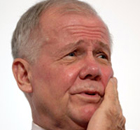Web Exclusive
Legal resources limited for risky derivative tradings
By Yu Hongyan (chinadaily.com.cn)
Updated: 2010-05-14 17:31
 |
Large Medium Small |
Authorities should not permit trade in financial products that may be fraudulent because there is no existing law to deal with complaints, said Guan Xiaofeng, a professor at China University of Political Science and Law.
"The products are extremely unfair, as banks take limited risks but investors' risks are infinite," he said in a report by Securities Daily. "Moreover, investors are unable to ask the banks to stop the trading even if they are aware of the risks."
The probe of big Wall Street banks in the US to determine if they misled investors reminds people of Chinese investors' losses on HSBC's "KODA" (Knock Out Discount Accumulator) product, the paper reported
| ||||
Its Chinese name misled some investors to think it was a deposit instrument, but it actually was an option product. Some investors say they were misled to sign deposit confirmations instead of option confirmations, and salespersons at the bank failed to give a clear risk warning of those high-risk financial products, said the paper.
Two victims of the products already sued the bank in 2008 after losing millions of yuan, the paper said.
Last year, a group of 30 millionaires sued 11 foreign banks including DBS, HSBC, and Citibank in Beijing, claiming those banks cheated them into buying complex financial derivatives which led to losses of more than HK$1 billion ($129 million), according to a previous China Daily report.















